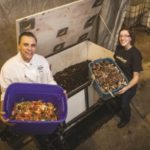Apparently, all it takes to keep worms happy is coffee – and other snacks like vegetables, sawdust, egg cartons and cardboard. In return, the hard-working red wigglers provide valuable, nutrient-rich fertilizer for plants in Lethbridge College’s Aquaculture Centre of Excellence (ACE) facility and the college’s applied researchers with a menu of ideas for future projects.
cardboard. In return, the hard-working red wigglers provide valuable, nutrient-rich fertilizer for plants in Lethbridge College’s Aquaculture Centre of Excellence (ACE) facility and the college’s applied researchers with a menu of ideas for future projects.
The worms at the college’s vermicomposting facility are thriving on waste from campus kitchens, coffee grounds from the Tim Hortons kiosk, and a host of other food items that applied researchers like John Derksen will be testing over the next few months. As an adjunct recycling process to the aquaponics facility, vermicomposting was suggested as a way to manage the filtered waste left over from the aquaponics system. “We’ve been talking about setting up composting for ages,” says
Chef Doug Overes (Professional Cooking 1987, Distinguished Alumnus 1992), chair of the college’s Culinary program. “And it just all fell into place with our colleagues in Aquaponics.” Thanks to the worms, “we’ve been able to take about 125 pounds a week of produce waste from the kitchens and keep it from the landfill,” Overes adds, and get a nutrient-rich product in return.
With the help of a local vermiculture company, Earthy Matters, Derksen, a biologist and the head of research at the Aquaculture Centre of Excellence, acquired a small commercial vermicomposting unit to add to the cycling and recycling of water and other materials at the centre. As the worms consume their food, they move from the bottom to the top of the composter, always moving upward to the new food source. A built-in blade slices off the bottom two inches of useable compost material.
“Each week, the worms are currently generating approximately 50 pounds of castings – a polite term for worm poop – which is rich in nutrients and can be used for a variety of purposes,” Derksen says. The abundance of composted, nutrient-rich material is exceeding their expectations, and also providing additional food for thought for related projects.
A simple idea like getting worms to eat waste materials – and scientifically testing the processes behind the idea to verify the best practices – can spin off in a variety of directions, Derksen says, and is a perfect example of the type of applied research he and his colleagues like to do. “We are looking to do something that is practical and relevant and that can be taken out to the real world to solve problems and make a difference. As simple as it is, this project is one which shows and tells about that process.”


